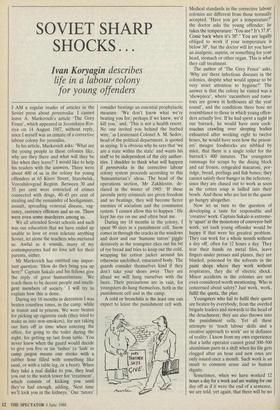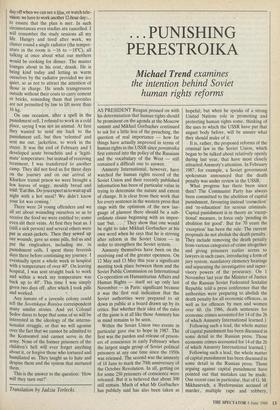SOVIET SHARP SHOCKS . . .
Ivan Koryagin describes
life in a labour colony for young offenders
I AM a regular reader of articles in the Soviet press about perestroika. I cannot leave A. Markovich's article 'The Grey Fence', which appeared in Sovetskaya Ros- siya on 14 August 1987, without reply, since I myself was an inmate of a corrective labour colony for juveniles.
In his article, Markovich asks: 'What are the young people in these colonies like, why are they there and what will they be like when they leave?' I would like to help his readers with the answers. There were about 400 of us in the colony for young offenders at 65 Kirov Street, Starobelsk, Voroshilovgrad Region. Between 30 and 35 per cent were convicted of crimes connected with drugs, 40-45 per cent of stealing and the remainder of hooliganism, assault, spreading venereal disease, vag- rancy, currency offences and so on. There were even some murderers among us.
We all attended Soviet schools and such was our education that we have ended up unable to love or even tolerate anything Soviet, let alone the teachers who nurtured us. Awful as it sounds, many of my contemporaries had no love left for their parents, either.
Mr Markovich has omitted one impor- tant question: 'How do they bring you up here?' Captain Sukalo and his fellows give the reply of great humanitarians: `We teach them to be decent people and intelli- gent members of society.' I will try to explain how this is done.
During my 18 months in detention I was beaten countless times, in the camp, while in transit and in prisons. We were beaten for picking up cigarette ends (they tried to make us into non-smokers), for not taking our hats off in time when entering the office, for going to the toilet during the night, for getting up last from table. You never knew when the guard would decide to give you five or six 'lashes' (a 'lash' in camp jargon means one stroke with a rubber hose filled with something like sand, or with a table leg, or a boot). When they take a real dislike to you, they lead you out to the watch tower for 'treatment', which consists of kicking you until they've had enough, adding, 'Next time we'll kick you in the kidneys.' Our 'tutors' consider beatings an essential prophylactic measure: 'We don't know what we're beating you for; perhaps if we knew, we'd kill you,' and, 'This is not a health resort. No one invited you behind the barbed wire,' as Lieutenant-Colonel A. M. Sedov, head of the political department, is quoted as saying. It is obvious why he says that 'we are a state within the state' and wants his staff to be independent of the city author- ities. I shudder to think what will happen if perestroika in the corrective labour colony system proceeds according to this 'humanitarian's' ideas. The head of the operations section, Mr Zakhlestin, de- clared in the winter of 1985: 'If these juvenile petty criminals are given freedom and no beatings, they will become fierce enemies of socialism and the communist system. I cannot allow this to happen.' He kept his eye on me and often beat me.
During my 18 months in the colony, I spent 90 days in a punishment cell. Snow comes in through the cracks in the windows and door and our `humane tutors' giggle derisively as the youngster ekes out his bit Of rye bread and tries to keep out the cold, wrapping his cotton• jacket around his otherwise unclothed, emaciated body. The guards consider themselves kind if they don't take your shoes away. They are afraid we will hang ourselves with the laces. Their precautions are in vain, for youngsters do hang themselves, both in the punishment cell and in the camp.
A cold or bronchitis is the least one can expect to leave the punishment cell with. Medical standards in the corrective labour colonies are different from those normally accepted. 'Have you got a temperature?' the doctor asks the young offender; he takes the temperature: 'You see? It's 37.8°. Come back when it's 38°:' You are legally obliged to work if your temperature is below 38°, but the doctor will let you have an analgesic, aspirin; or something for your head, stomach or other organ. This is what they call treatment.
The author of `The Grey Fence' asks, 'Why are there infectious .diseases in the colonies, despite what would appear to be very 'strict attention to hygiene?' The answer is that the colony he visited was a 'showpiece', where 'cucumbers and toma- toes are grown in hothouses all the year round', and the conditions there bore no resemblance to those in which young offen- ders actually live. If he had spent a night in our barrack, he would have seen cock- roaches crawling over sleeping bodies exhausted after working eight to twelve hours, he would have seen how the prison- ers' meagre foodstocks are nibbled by mice, that there is a single toilet for the barrack's 400 inmates. The youngsters rummage for scraps by the dining block and eat frozen, congealed macaroni, por- ridge, bread, peelings and fish bones; they cannot satisfy their hunger in the refectory, since they are chased out to work as soon as ' the rotten soup is ladled into their bowls. And those who are last in the queue go hungry altogether.
Now let us turn to the question of developing a taste for responsible and 'creative' work. Captain Sukalo is extreme- ly 'upset' at the monotony of conveyor-belt work, yet each young offender would be happy if that were his greatest problem. They can work for a whole month without a day off, often for 12 hours a day. They tear their hands on metal files, leave fingers under presses and planes, they are blinded, poisoned by the solvents in the paint shops where they work without respirators, they die of electric shock. Minor accidents in the colonies are not even considered worth mentioning. Who is concerned about safety? Just work, work, fidfil the quota, the plan.
Youngsters who fait to fulfil their quota are beaten by everybody, from the overfed brigade leaders and stewards to the head of the detachment; they are also thrown into the punishment cells. Yet all these attempts to 'teach labour skills. and a creative approach to work' are in defiance of reality: I know from my own experience that a lathe operator cannot grind 300-500 aluminium parts in a shift when his file gets clogged after an hour and new ones are only issued once a month. Such work is an insult to common sense and to human dignity.
Sometimes, when we have worked 12 hours a day for a week and are waiting for our day off as if it were the end of a sentence, we are told, yet again, that there will be no day off when we can see a film, or watch tele- vision: we have to work another 12-hour day.. to ensure that the plan is met. In such circumstances even studies are cancelled. I will remember the study sessions all my life. Hungry and tired after work, we Cluster round a single radiator (the temper- ature in the room is –16 to –18°C), all talking at Once about what our mothers would be cooking for dinner. The master lounges about in his coat, drunk. He is being kind today and letting us warm ourselves by the radiator provided we Are quiet, so as not to attract the attention of those in charge. He sends transgressors outside without their coats to carry cement or bricks, reminding them that juveniles are not permitted by law to lift more than 16 kg.
On one occasion, after a spell in the punishment cell, I refused to work in a cold place, saying I was not an animal. At first they wanted to send me back to the punishment cell, but then 'relented' and sent me out, jacketless, to work in the street. It was the end of February and I developed acute bronchitis and a 'legiti- mate' temperature, but instead of receiving treatment, I was transferred to another camp. They did not feed us for three days on the journey and on our arrival at Kharkov transit prison we were brought a few loaves of soggy, mouldy bread and told: 'Eat this. Do you expect us to wait up all night with a hot meal? We didn't know your lot was coming.'
There were 24 young offenders and we all set about wounding ourselves so as to receive the food we were entitled to; some even slit their veins. At first they beat us. I (still a sick person) and several others were put in strait-jackets. Then they sewed up our wounds, gave us some pills, fed us and put the ringleaders, including me, in Punishment cells. I spent three feverish days there before continuing my journey. I eventually spent a whole week in hospital with a temperature of over 40°. On leaving hospital, I was sent straight back to work and within a week my temperature was back up to 40°. This time I was simply given two days off, after which I took pills and worked.
Any inmate of a juvenile colony could tell the Sovetskaya Rossiya correspondent many similar stories. And yet Colonel Sedov dares to hope that some of us will be interested in the ideology of the interna- tionalist struggle, or that we will agonise over the fact that we cannot be admitted to the Komsomol and cannot serve in the army. None of the former prisoners of the children's hell will ever forget anything about it, or forgive those who tortured and humiliated us. They taught us to hate and despise them and the system that nurtured them.
This is the answer to the question: 'How will they turn out?'



















































 Previous page
Previous page